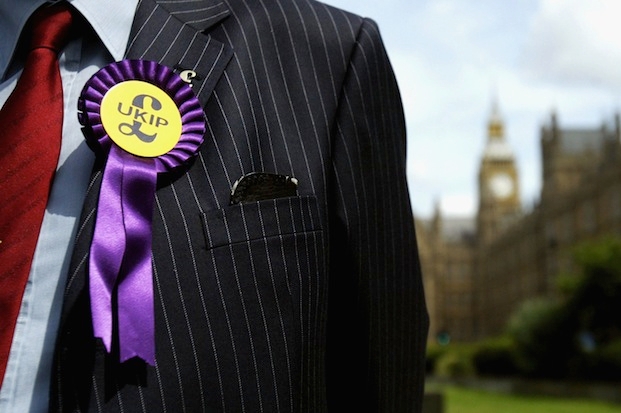In the 2010 general election, Ukip gained nearly a million votes — over 3 per cent — three times as many as the Greens, and nearly twice as many as the SNP. Unlike those parties, it won no seats, but its intervention almost certainly cost the Conservatives an overall majority at Westminster. The paradoxical consequence was to hand the balance of power at Westminster to the most pro-European party in British politics, the Liberal Democrats. In the local elections last year, Ukip won 24 per cent of the vote, and is well placed to win the European parliament elections in May. Its impact in next year’s general election is likely to be even greater than in 2010.
So far, explanations of the Ukip phenomenon have been long on assertion but short on evidence. David Cameron notoriously declared in 2006 that the party was composed of ‘fruitcakes, loonies and closet racists’. Around the same time, a Labour cabinet minister told me that Ukip was ‘the BNP in blazers’, while the Observer journalist Nick Cohen believes that Ukip offers ‘a garish picture of what the British right looks like when it has had one beer too many’.
To such critics, Ukip is an illegitimate intruder. Yet, survey evidence has repeatedly shown that a large minority of the electorate, and, in some polls, a majority, want Britain to leave the European Union. In a well-ordered democracy a viewpoint so widely supported should have a voice, not only in the country, but in parliament.
Nigel Farage has struggled to free Ukip from the taint of racism and Islamophobia. Former BNP members are now disqualified from Ukip membership, and Farage has insisted that Ukip will not join Marine Le Pen or Geert Wilders in the European parliament. Indeed, he argues that, unless Ukip has a strong presence in the European parliament, the anti-European cause in the European parliament will be left in the hands of racists.
Current conventional wisdom holds that the typical Ukip supporter is Disgusted of Tunbridge Wells, an elderly Tory — perhaps a retired army officer — spluttering over his gin and tonic as he reads his Daily Mail at the 19th hole. One of the many merits of Revolt on the Right is that it shows the falsity of this caricature.
Ukip support comes primarily not from the well-heeled, but from the disadvantaged and insecure — the victims of social and economic change, alienated from a meritocratic political establishment — the elderly white semi-skilled or unskilled working class. The typical Ukip supporter has a white skin, a blue collar and grey hair; indeed Ukip’s social base is more working class than that of any of the major parties.
The rise of Ukip reflects wider changes in British society, the decline of the working class and the failure of the mainstream political parties to represent it. In 1964, when Harold Wilson brought Labour to power after 13 years in opposition, two-thirds of the electorate were working class, and one-third middle class. The working class was crucial for electoral success, and the Conservatives could win only by detaching a large portion of it from its normal Labour allegiance. But by 2010, just three-sevenths of the electorate were working class, while four-sevenths — a majority — were middle class.
Tony Blair’s New Labour sought to win over graduates, middle-class professionals and aspirationals — those who aspired to leave the working class. The Conservatives, under Cameron, seeking to distance themselves from the image of the ‘nasty party’, sought to win over the same social groupings. All three parties welcomed globalisation, multiculturalism, neo-liberal economics, and, with their support for gay marriage, alternative life styles. That is not an agenda with much appeal to those left behind.
David Cameron is often mistakenly seen as a child of privilege. He is in fact, like Miliband and Clegg, a child of meritocracy, a product of academic success. All three party leaders belong to the exam-passing classes. This makes them ill-equipped to understand those who have not passed exams. The left behind have therefore become politically, as well as socially and economically, marginalised. It is they who form the bedrock of Ukip support.
Revolt on the Right is written by two young political scientists, Robert Ford and Matthew Goodwin. It is based on rigorous analysis of survey evidence, as well as interviews with leading Ukip figures. It shows convincingly how the Ukip insurgency reflects deeper changes in British society, changes that the three major parties have barely glimpsed. Revolt on the Right is not only an outstanding work of political science. It is also one of the most important books on British politics to have appeared for many years.






Comments